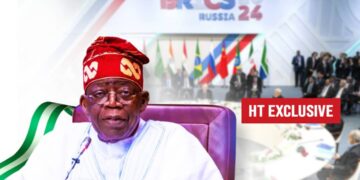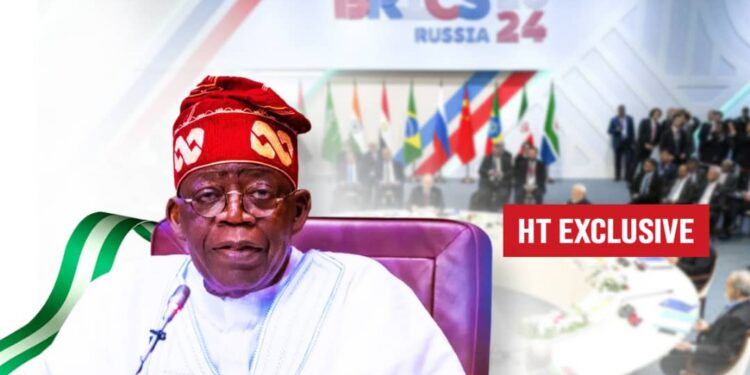By Enyichukwu Enemanna
Nigeria’s long wish to foster closer alliance with the BRICS bloc, representing a group of major emerging economies has finally received a boost with its recent admission as a partner nation. This becomes even more exciting after the African giant was “snubbed” last year during a membership expansion that saw the likes of Ethiopia, Iran, Egypt, Argentina, United Arab Emirates and Saudi Arabia receive invitation to join the group, which derived its name from the initials of its members — Brazil, Russia, India, China and South Africa.
Read Also: Nigeria, 12 Others Join BRICS As Partner Countries
“We want a partnership that provides opportunities for all to engage in trade, prosperity and shared progress with no marginalization based on geography, race and legitimate sovereign affiliations,” Nigeria’s Vice President, Kashim Shettima had told the bloc while attending its 15th annual summit in Johannesburg, South Africa where the new invitees finalised their membership process ahead of January 1, 2024 formal acceptance. Shettima also emphasized the need for regional organisations and the creation of a new model of international collaboration.
One year later, specifically at the 16th summit of the group held in Kazan, Russia, from October 22 to 24, 2024, Nigeria alongside 12 others, including Algeria, Belarus, Bolivia, Cuba, Indonesia, Kazakhstan, Malaysia, Thailand, Turkey, Uganda, Uzbekistan, and Vietnam were admitted as partner nations. “BRICS officially adds 13 new nations to the alliance as partner countries (not full members)”, a statement on the BRICS official X (formerly Twitter) handle confirmed.
This is viewed as a step further for the largest black nation to consolidate its economic ties with emerging markets. Nigeria as a third world country, incubating millions of poor people amidst abundant natural and human resources could leverage on this alliance to open new frontiers that will tap into its dormant pool of mineral deposits and position itself truly as a giant.
Recent trends have indicated that BRICS which challenges western hegemonic dominance in global politics and economy is gradually becoming a viable rival to the G7 bloc comprising Canada, France, Germany, Italy, Japan, the United Kingdom and the United States of America. It has shown strength in terms of share of the total global Gross Domestic Products (GDP), as per Purchasing Power Parity (PPP).
BRICS had last year revealed that the GDP of their nations accounted for 31.5 percent of global GDP compared to the 30.7 percent of the G7 nations. BRICS nations at the moment account for 45% of the global population, having India and China in its fold, considered two most populous nations in the globe. Added together, members’ economies are worth more than $28.5tn (£22tn), representing about 28% of the global economy.
Odds That Played Against Nigeria
While it is cheering news that the country has finally achieved a formal alliance with the BRICS by way of its status as a “partner nation”, it is important to take a look at some salient factors that may have denied it opportunity to become a full member where the likes of South Africa, Ethiopia and Egypt enjoy all rights and privileges of full membership.
By all standard, Nigeria deserves a permanent seat (if one exists) in BRICS, standing as the largest economy in Africa with a GDP estimated at $477.39 billion and ranks among the world’s top 30 economies. Going by this metrics of economy, nothing should have stopped the African giant from sitting in the bloc as a full member. South Africa became the first African nation to join the fold in 2010, but has a GDP of $405.7 billion, the second-highest number in the continent after Nigeria. On the other hand, Egypt and Ethiopia have GDP values of $404 billion and $111.3 billion, respectively. Ethiopia, whose full membership was rectified January 1 has an economy less than one quarter of the Nigerian GDP.
Despite these indices, Nigeria is yet to command the influence and dominance it ought to in global economy or even at the continental level. A number of factors may be responsible for this. As of March 2023, the country ranked 131st out of 190 economies in the World Bank’s annual ease of doing business ratings. This implies that the regulatory environments are not as supportive as they ought to be, arising from factors such as escalating costs, scarcity of forex, poor infrastructure and stifling bureaucracies. These make the country a less attractive destination for business.
Additionally, security concerns that have in the past decade and half escalated in the West African nation may have been a factor that played against it at the politics of BRICS membership. The World Population Review insights for 2024 showed that Nigeria ranked among the top dangerous countries in Africa. In identifying “dangerous” countries, the Global Peace Index, a comparative metric that looks at crime rates across the board was used. Some of the indices include stable politics, lower crime rates, acts of terrorism, violent crimes, relationships with neighbouring countries, and the percentage of its citizens that are displaced.
Also, judiciary plays a vital role in building the confidence of investors with regards to the protection of their business interests. Political interference and inconsistency in the judiciary erodes confidence. Where a ruling of the court is perceived to have been manifestly influenced, it affects the institution’s reputation and that of the country before the international community.
In the area of corruption perception, though there seems to be a slight improvement, there is still so much work to be done. In the 2023 Corruption Perception Index, published by Transparency International Nigeria, the country ranked 145 out of 180 countries and scored 25 out of 100 points. This represents a rise five places above its previous ranking in the 2022 CPI, where Nigeria placed 150 out of 180 countries, and scored 24 of 100 points. It was the first by Transparency International since the inception of President Bola Tinubu administration.
Prospect for Nigeria
In November last year, the country’s Minister of Foreign Affairs, Amb. Yusuf Tuggar highlighted Nigeria’s ambition to join BRICS and the G20 group of nations within two years. According to Tuggar, Nigeria’s large economy and substantial population made it a suitable candidate for such organisations.
Tuggar’s statement reflects the growing recognition of Nigeria’s importance on the global economic stage and its potential to contribute to multilateral organizations like BRICS. As a partner country, Nigeria is now positioned to further leverage its economic strengths and continue building its international partnerships.
The country’s quest to diversify its economy and reduce over-reliance on oil amidst global campaign for clean energy will now receive a fresh boost. Agriculture for instance wields huge potentials that can help de-populate the country’s saturated labour market. Leveraging on the BRICS partnership, Nigeria can expand the agricultural value chain by optimizing the performance of the existing bank of agriculture. Despite the huge West African state’s arable farmland, it has endured food shortage and escalating hunger, owing to poor research and insecurity that has displaced a large number of farmers as well as high cost of fertilizers and pesticides. The alliance is hopeful to position the sector for more attention, provide access to training and capacity building that could be the magic wand.
Nigeria is in dire need of investment in the area of infrastructure. Infrastructure brings development and opens the space for economic opportunities. Availability of access roads to rural communities brings the people closer to a more robust commercial and social life, helps in enhancing livelihood. The shortage of energy in the country has also come with huge economic implications, exacerbated by the regular collapse of national grid. Available data indicates that in the last ten years, the national grid collapsed 105 times, seeing Nigerians endure hours of blackout. The estimated daily discharge of 4,500 MW of electricity is grossly inadequate for a population of over 200 million. The BRICS alliance can give the country a sigh of relief with increased investment renewable energy.
Another takeaway that may come from this partnership is that it could open the door for trade expansion, assist Nigeria to create new market to export both agricultural produce and huge mineral deposits. Mining sector presents a vast opportunity for economic growth but has been hampered by plethora of challenges, including inadequate infrastructure, regulatory inconsistencies and limited access to financing. With an estimated value of $700–750 billion, it could be a key driver of industrial development.
Also to look forward to with BRICS alliance is a possible access to technology and knowledge. Nigeria cannot lag behind in a world where there is permanently a quest to adopt innovative means to bring solutions to nagging social and economic challenges. The country stands a good position of collaborating with other BRICS members to facilitate technology transfer and innovation in sectors like industry, security, agriculture, energy and healthcare.
It is hoped that this partnership will foster a relationship that will optimize Nigeria’s huge potentials for the general good of every citizen.




































